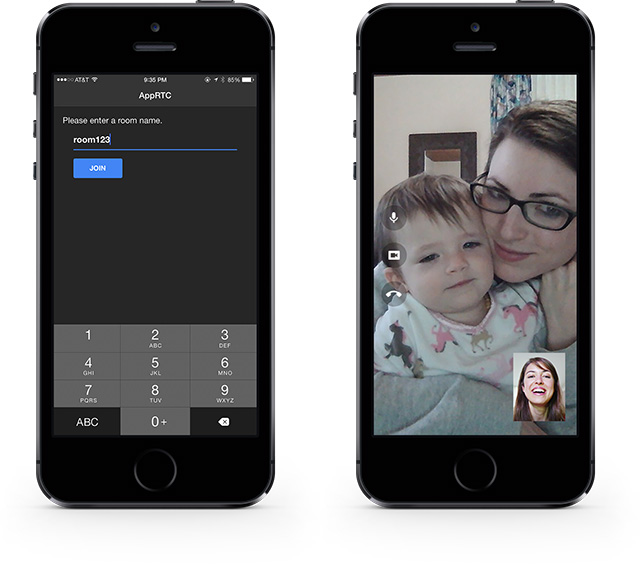This Xcode project is a native wrapper for the Google's WebRTC Demo. It organizes the WebRTC components into a cocoa pod that can be easily deployed into any Xcode project. The precompiled libWebRTC static library bundled with the pod works with 64-bit apps, unlike prior versions of WebRTC projects where only the 32-bit version was available. Currently, the project is designed to run on iOS Devices (iOS Simulator is not supported).
Included in this Xcode project is a native Storyboard based Room Locator and Video Chat View Controllers:
- Fully native objective-c 64-bit support
- pre-compiled libWebRTC.a (saves you hours of compiling)
- Starting in v1.0.2 we are now referencing pod libjingle_peerconnection maintained by Pristine.io that has a an automated libWebRTC.a build process
- Utilizes Cocoa Pod dependency management
- View Controllers to easily drop into your own project
- Exposed APIs to easily customize and adapt to your needs (see below for more details)
- Supports the most recent https://apprtc.appspot.com (October 2015)
- We also have a fork of the Google AppRTC Web Server that maintains full compatibility with this project
The following resources were useful in helping get this project to where it is today:
- How to get started with WebRTC and iOS without wasting 10 hours of your life
- hiroeorz's AppRTCDemo Project
- Pristine.io Automated WebRTC Building
To run the app on your iPhone or iPad you can fork this repository and open the AppRTC.xcworkspace in Xcode and compile onto your iOS Device to check it out. By default the server address is set to https://apprtc.appspot.com.
If you'd like to incorporate WebRTC Video Chat into your own application, you can install the AppRTC pod:
pod install AppRTC
From there you can look at the ARTCVideoChatViewController class in this repo. The following steps below detail the specific changes you will need to make in your app to add Video Chat.
WebRTC can communicate securely over SSL. This is required if you want to test over https://apprtc.appspot.com. You'll need to modify your AppDelegate.m class with the following:
- Import the RTCPeerConnectionFactory.h
#import "RTCPeerConnectionFactory.h"
- Add the following to your
application:didFinishLaunchingWithOptions:method:
[RTCPeerConnectionFactory initializeSSL];- Add the following to your
applicationWillTerminate:method:
[RTCPeerConnectionFactory deinitializeSSL];To add video chat to your app you will need 2 views:
- Local Video View - Where the video is rendered from your device camera
- Remote Video View - where the video is rendered for the remote camera
To do this, perform the following:
- In your ViewController or whatever class you are using that contains the 2 views defined above add the following headers imports:
#import <libjingle_peerconnection/RTCEAGLVideoView.h>
#import <AppRTC/ARDAppClient.h>- The class should implement the
ARDAppClientDelegateandRTCEAGLVideoViewDelegateprotocols:
@interface ARTCVideoChatViewController : UIViewController <ARDAppClientDelegate, RTCEAGLVideoViewDelegate>* `ARDAppClientDelegate` - Handles events when remote client connects and disconnect states. Also, handles events when local and remote video feeds are received.
* `RTCEAGLVideoViewDelegate` - Handles event for determining the video frame size.
- Define the following properties in your class:
@property (strong, nonatomic) ARDAppClient *client;
@property (strong, nonatomic) IBOutlet RTCEAGLVideoView *remoteView;
@property (strong, nonatomic) IBOutlet RTCEAGLVideoView *localView;
@property (strong, nonatomic) RTCVideoTrack *localVideoTrack;
@property (strong, nonatomic) RTCVideoTrack *remoteVideoTrack;* *ARDAppClient* - Performs the connection to the AppRTC Server and joins the chat room
* *remoteView* - Renders the Remote Video in the view
* *localView* - Renders the Local Video in the view
- When initializing the the property variables make sure to set the delegates:
/* Initializes the ARDAppClient with the delegate assignment */
self.client = [[ARDAppClient alloc] initWithDelegate:self];
/* RTCEAGLVideoViewDelegate provides notifications on video frame dimensions */
[self.remoteView setDelegate:self];
[self.localView setDelegate:self];- Connect to a Video Chat Room
[self.client setServerHostUrl:@"https://apprtc.appspot.com"];
[self.client connectToRoomWithId:@"room123" options:nil];- Handle the delegate methods for
ARDAppClientDelegate
- (void)appClient:(ARDAppClient *)client didChangeState:(ARDAppClientState)state {
switch (state) {
case kARDAppClientStateConnected:
NSLog(@"Client connected.");
break;
case kARDAppClientStateConnecting:
NSLog(@"Client connecting.");
break;
case kARDAppClientStateDisconnected:
NSLog(@"Client disconnected.");
[self remoteDisconnected];
break;
}
}
- (void)appClient:(ARDAppClient *)client didReceiveLocalVideoTrack:(RTCVideoTrack *)localVideoTrack {
self.localVideoTrack = localVideoTrack;
[self.localVideoTrack addRenderer:self.localView];
}
- (void)appClient:(ARDAppClient *)client didReceiveRemoteVideoTrack:(RTCVideoTrack *)remoteVideoTrack {
self.remoteVideoTrack = remoteVideoTrack;
[self.remoteVideoTrack addRenderer:self.remoteView];
}
- (void)appClient:(ARDAppClient *)client didError:(NSError *)error {
/* Handle the error */
}- Handle the delegate callbacks for
RTCEAGLVideoViewDelegate
- (void)videoView:(RTCEAGLVideoView *)videoView didChangeVideoSize:(CGSize)size {
/* resize self.localView or self.remoteView based on the size returned */
}If you'd like to contribute, please fork the repository and issue pull requests. If you have any special requests and want to collaborate, please contact me directly. Thanks!
The following are known issues that are being worked and should be released shortly:
- None at this time
